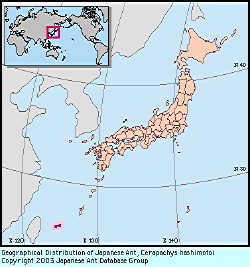
|
species
|
Cerapachys hashimotoi
|
 |
Japanese Name
|
Jyuuni-kubire-hari-ari
|
Original Reference
|
|
Terayama, M. (1996) Taxonomic studies of the Japanese Formicidae, part 2. Seven genera of Ponerinae, Cerapachyinae and Myrmicinae. Nature and Human Activities, 1, 9-32.
|
Description
|
|
Total length of workers around 3.5 mm. The largest species among Japanese cerapachyines. Body color reddish brown. Antennae 12-segmented. Body surface covered with coarse punctures, the interspaces smooth and shining. Body hairs sparse. Eyes present. Pronotum weakly marginate anteriorly. Petiole almost as long as wide; subpetiolar process distinct. Constriction between 1st and 2nd gastral segments distinct. Second gastral segment shorter than total length of petiole + 1st gastral segment.
|
Remarks
|
|
The true status of this species is uncertain. It is similar to C. reticulatus Emery from Taiwan, C. dohertyi Emery from Sumatra and Borneo, and C. salimani Karavaiev from Java. Very rare.
|
|

Distribution
|
|
Nansei Is (Iriomote I. [Yoshiaki Hashimoto leg.]).
|
|
Editor
|
|
Original text Kazuo Ogata and Mamoru Terayama. English translation by Kazuo Ogata, edited by Robert W. Taylor
|
|